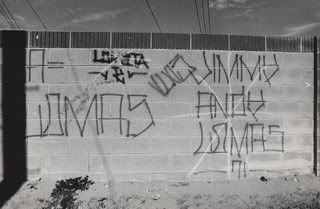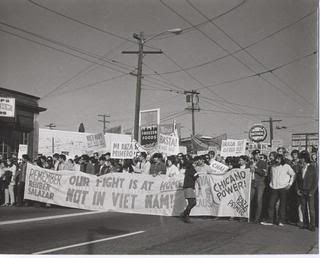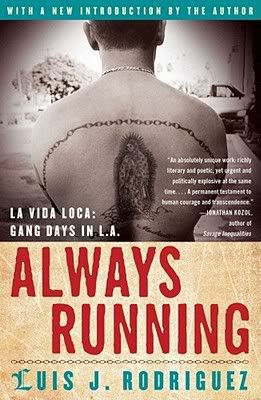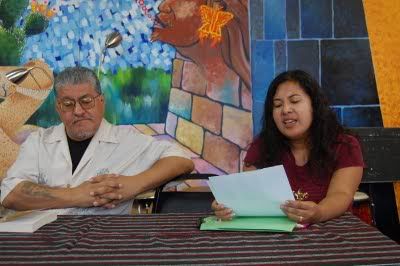The Facts:
Year of Birth: 1954
Place of Birth: The city of El Paso, Texas - located on the Mexican-American border.
Ethnicity: "Mexika/Ramruri indigenous descent
Early Life: At the age of two, Rodriguez's family migrated to Los Angeles. Rodriguez began stealing at the age of 7, joined a gang by the age of 11, and by the age of 12, he started using drugs. When he was 15 year old, Rodriguez dropped out of school, and his parents kicked him out of their home. He was living on the streets for a while until he was able to go back and live in his family's garage.
Between the ages of 13 and 18, he was arrested for crimes ranging from stealing and fighting, to attempted murder and assaulting police officers.

Luis Rodriguez was part of the Lomas gang (in the San Gabriel Valley), whose rival is the Sangra 13 gang.
Involvement in the Chican@ Movement:
Despite his involvement in the Lomas gang, Rodriguez became very active in the Chicano Movement, which took place during the 1960's and 1970's. He participated in the East L.A. School Walkouts in 1968 and was present at the Chicano Moratorium against the Vietnam War on August 31, 1970.

At this time, Rodriguez became more involved with his community. He painted several murals in 1972, and eventually returned to finish high school. He became a leader of the Chicano student group there, and briefly attended the California State University in Los Angeles. While attending college, he was active in the Chicano activist group MeCha (Movimiento Estudiantil Chican@ de Aztlán).
The Turning Point:
Both aspects of his life (his gang involvement and his community involvement) clashed while he was age 18. He was sentenced to six years in prison for a criminal charge, and at this stage in his life, he was addicted to heroin and numerous friends of his were killed in gang violence. Fellow community members whom he worked with wrote letters on his behalf and decreased his sentence to a lesser charge.
Feeling indebted to those who believed in him, Rodriguez stopped doing drugs and devoted himself to helping his community of Mexican-Americans. Since he was unable to continue his college studies, he worked various jobs such as being a bus driving and working at a steel mill.
Writing Career:
In 1980, Rodriguez took night classes at East Los Angeles College and began doing work as a photographer and a reporter for several newspapers and publications. For the next several years, he became immersed in various work and organizations. He attended a the Summer Program for Minority Journalists at UC Berkeley, helped run the L.A. Latino Writers Association, published ChismeArte Magazine, and also attended workshops in prisons and juvenile centers.
Rodriguez moved to Chicago in 1985 to become editor of a national revolutionary newspaper, the People's Tribune.
In 1988, he became involved in the Chicago poetry scene, helping to organize the Chicago Poetry Festivals. He started to read his own work in various locations like cafes and libraries.
He started a poetry press called Tia Chucha press in 1989 and published his first book of poetry, Poems across the Pavement. He published the poetry of many authors, and still continued to do freelanced journalism work. In 1991, his second book of poetry, The Concrete River, was published by Curbstone Press.
Luis Rodriguez's first novel began as a letter to his son in an attempt to recount the dangers of involvement in gang life and to serve as a warning. However, the message can a little too late, and his son was incarcerated and is currently serving time in the Illinois State Prison. Rodriguez's work, instead, evolved into the novel, Always Running (published in 1993), a memoir of Rodriguez's past life on the streets of L.A.
After the success of his novel, Rodriguez quit his job in order to devote his time to promoting his book and writing career. Simon and Schuster's Touchstone Books bought the rights to the paperback version in 1994, and Always Running became an international best seller.

Since then, Rodriguez has gone on to write and publish an extensive amount of work (see separate post for a complete list of his works).
He traveled all over Europe, South America, Asia, and the U.S. giving lectures, workshops, and promotional visits. He continues to work with Native American groups and various organizations that promote gang prevention.
In 2000, Rodriguez and his family moved back to Los Angeles, California where him, his family, and other community members helped create Tia Chucha's Cafe Cultural. It is a combination of a bookstore, cafe, performance space, and art gallery. Tia Chucha's hosts numerous events such as ethnic dance classes, book signings, and poetry recitations. It has become a place where arts can flourish in an otherwise poverty-stricken area.

Currently, Tia Chucha's is at a temporary location. At the original location, the landlords tripled the rent so that they could bring in a laundromat. The owners of Tia Chucha's are looking for a permanent and bigger location for the cultural cafe.
Legacy:
Rodriguez uses his works to send a message to other youths who are faced with the same choices that he once faced in his past. An outlet, that means of escape, does not have to be drugs, gangs, or violence. It can be a more constructive path like words. Rodriguez uses his words to capture what so many youths cannot express in their society, be it in East L.A. or other areas. In this regard, he becomes an example for others to find a constructive way of expressing themselves.
In the scope of the larger Chican@ Movement, Luis Rodriguez is quite unique in his focus. He is dedicated to helping his community solve the side-effects of poverty and racism through the arts. He started his own publishing company for poetry, and continually works with others -- such as youths, prisoners, and minorities -- to develop voices of their own. While he could have limited himself to just writing works and reaching people through this way, he took it a step farther and continues to help others find their own outlet through constructive means. He provides a lasting legacy solving problems -- be they racial, social, etc. -- through working with others and getting involved in the community.
For a more detailed bio, please visit his official website here:
http://www.luisjrodriguez.com/history/history.html
On this website, Rodriguez writes his own blog, which you can read!
No comments:
Post a Comment